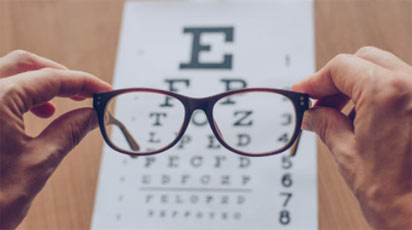To maintain optimal vision, most eye care professionals recommend that you receive a vision exam once every 1 or 2 years, especially for adults over 40. But if this is your first visit to an eye care professional, the process may seem confusing. To help reduce stress and better prepare you for your appointment, we offer this brief overview of the procedure as well as a few tips on what you can do to make the exam go as smoothly as possible.

The Exam
Typically the exam will begin by obtaining some basic information about your medical and vision history. The doctor may, for example, ask about any familial history of eye disorders such as glaucoma or cataracts to gain a more detailed clinical picture of your case.
The exam itself covers a range of eye tests using different technologies to assess the physical structures of your eyes as well as your vision. These tests may include…
Eye Muscle Movement Test
The doctor will ask you to follow an object, like a pen, with your gaze while keeping your head still. This will help determine whether the muscles governing eye movement are working properly.
Cover Test
The doctor will ask you to focus on a target object some distance away. Then you’ll be asked to cover and uncover each eye in turn while remaining focused on the object. The cover test assesses how well your eyes function as a team.
Pupil Reactivity
The doctor will check each eye with a bright light to ensure that your pupils react properly to changes in light.
Visual Acuity Testing
The doctor will ask you to read the letters or numbers on an eye chart at a distance, first with one eye and then the other.
Refraction Testing
If you need corrective lenses, the doctor may use a computerized refractor to fine-tune your prescription.
Biomicroscopic Tests
Also called “slit lamp testing,” these tests examine the physical structures of the eye (such as the iris, cornea, and lens) to rule out any physical defect or injury.
Retinal Exam
The doctor may dilate your pupils and then use a machine called an ophthalmoscope to visualize the inner portions of the eye, including the retina (the “movie screen” in the back of the eye, on which the lens projects images).
Glaucoma Testing
Your doctor may also include tests for specific conditions such as glaucoma, especially if you are over 40 or have a family history of a vision disorder. Glaucoma testing evaluates the pressure of the fluid within the eye.
Pachymetry
To measure the thickness of the cornea, your doctor may perform what is called “pachymetry,” which can detect abnormal thickening of the cornea that can confound pressure tests used in glaucoma diagnosis.
Pupil Dilation
To fully visualize the internal structures of your eyes, your doctor may administer eye drops to fully dilate your pupils. These drops may take 20–30 minutes to work, and can make you sensitive to light briefly after the exam.
Visual Field Testing
This test allows your doctor to assess your full field of vision while your eyes are motionless. This helps ensure that your peripheral vision (what you see from the “corners of your eyes”) remains optimal.
How You Can Prepare
When making an appointment with your vision professional, be sure to describe the primary reason for your visit (such as blurry vision, headaches, or nearsightedness). Before your appointment, write down any questions you may have for your eye care team. Also, make note of any prescription medications that you may be taking that could affect your vision. If you have a current eyeglass or contact lens prescription, bring it with you to the appointment.
Because the doctor may use drops to dilate your pupils, you may be more sensitive to light for a brief period following the procedure. For this reason we recommend that you bring a pair of sunglasses along for the drive home—or, if you prefer, arrange for a ride to and from the appointment.
We hope these tips make your next eye exam a stress-free experience. At Integrity Eye Associates, we care how you see the world. That’s why we’re dedicated to providing the best on-site eye exams and diagnostic and corrective care, as well as a broad range of eyewear style options to suit every style. Visit Integrity Eye Associates today!
